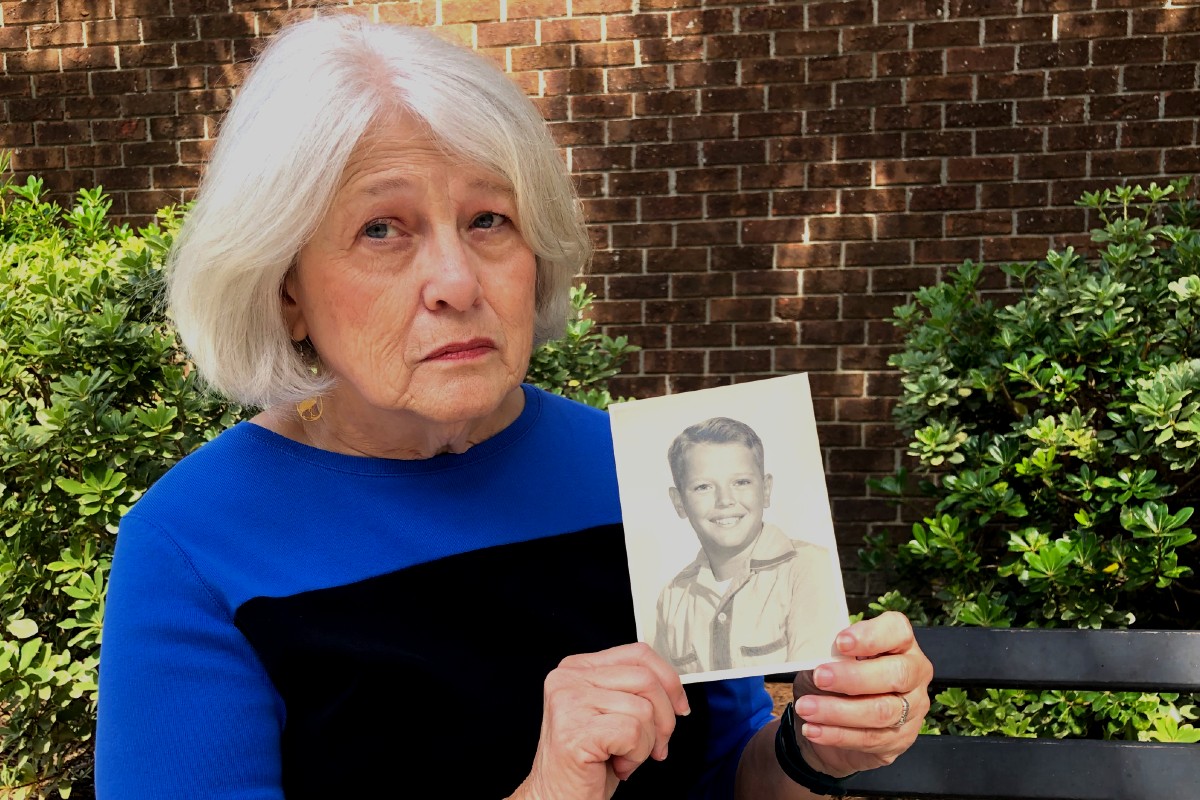
EDITOR’S NOTE: The following news story gives more detail about toxic water at North Carolina’s Camp Lejeune that was explored in an earlier commentary.
By Lewis Kendall, special to Statehouse Report | When James Island resident Rose Ann Boxx’s brother turned 32 in the late 1970s, he was diagnosed with colon cancer.
The diagnosis for Robert Thomas, came as a surprise — because of his age and also because there was no history of cancer of any kind on either side of the family. But another surprise loomed for kids like Rose Ann and Robert who spent formative years in the late 1950s at Camp Lejeune where their father was a Marine — the water was toxic, poisoned for more than three decades by chemicals that leaked into the water supply. Thousands — including Robert and, eventually, Rose Ann — got cancer.
This week, she recalled how her older brother Robert went through several rounds of chemotherapy and radiation treatment to try to reverse the disease’s spread. In the throes of the disease, he managed to make jokes, she said, likening himself to a large Pac-Man, his body being slowly gnawed away by a foreign, floating enemy.
“They’ll take a little bit of me every time, but that’s okay,” he would tell Boxx.
For a while, things improved. He continued his job working for Charleston County and meeting up with Boxx for the occasional lunch. But then the cancer returned, this time in his lymph nodes. Robert died Sept. 30, 1982. He was 37.
“We should be thriving, instead of dying”

Nearly 40 years later, Boxx is still trying to make sense of her brother’s death. She counts herself among the thousands of family members of veterans fighting for recognition and compensation from the U.S. military over decades of negligent water contamination at Lejeune that caused myriad cancers and other significant negative health impacts in servicemembers, their dependents and employees on the base.
A new bill currently working its way through Congress aims to provide relief. The Camp Lejeune Justice Act would allow anyone exposed to contamination on the base between 1953 and 1987 to sue the government for damages. A separate bill, the Toxic Exposure in the American Military, or TEAM Act, would provide health care for veterans exposed to a number of toxic substances, including those at Lejeune.
Despite some 75 cosponsors, the Justice Act has remained stalled in committee. On Thursday, the bill was referred to the House Subcommittee on the Constitution, Civil Rights and Civil Liberties. But advocates — a step short of hopeful — remain determined to push it across the line.
“We’re going to stand up for this issue until we see something happen,” said Curtis Crawford, 58, a Virginia resident who spent time on Lejeune when he was younger and now suffers from several conditions, including fibromyalgia and vitiligo, that he attributes to the water.
“None of us should have this stuff. We should be thriving instead of dying.”
A look back at Camp Lejeune
Built in 1942 in Jacksonville, N.C., as a training facility for troops for World War II, Camp Lejeune, at more than 240 square miles, remains one of the largest military bases on the East Coast. Lejeune currently supports roughly 100,000 people, including a mall and 80 firing ranges.
 In the early 1980s, the Marine Corps discovered elevated levels of volatile organic compounds (VOCs) in the drinking water on Lejeune, including PCE (tetrachloroethylene) and TCE (trichloroethylene). Other contaminants, including refined petroleum products such as benzene — a known carcinogen — had tainted the drinking water far beyond levels deemed acceptable to both the EPA and CDC via the leaking of underground storage tanks, industrial area spills and waste disposal sites. As much as 1.1 million gallons of fuel may have leaked from storage tanks on the base, according to a separate report. Further research has indicated that the contamination may have begun as far back as 1948.
In the early 1980s, the Marine Corps discovered elevated levels of volatile organic compounds (VOCs) in the drinking water on Lejeune, including PCE (tetrachloroethylene) and TCE (trichloroethylene). Other contaminants, including refined petroleum products such as benzene — a known carcinogen — had tainted the drinking water far beyond levels deemed acceptable to both the EPA and CDC via the leaking of underground storage tanks, industrial area spills and waste disposal sites. As much as 1.1 million gallons of fuel may have leaked from storage tanks on the base, according to a separate report. Further research has indicated that the contamination may have begun as far back as 1948.
A 2017 CDC report concluded that the contaminants “increased cancer risk and increased potential of experiencing adverse, noncancer health effects” for those who had been on the base and consumed or otherwise been exposed to the water.
Considering Lejeune’s size and the fact that the contamination lasted decades, the government has since disclosed that as many as 1 million military and civilian staff and their families may have been affected. Nearly 275,000 have signed up as part of the Marines Corps’ database intended for those who lived or worked at Lejeune during the period in question, including more than 7,600 in South Carolina.
Moreover, documents show that, despite being notified of contamination as early as 1982, over the years the U.S. military has dragged its feet on addressing the issue and notifying those impacted.
Tired of the empty talk
For her part, Boxx is fed up with all the empty talk from politicians and military officials. Ever since she first found out about the contamination through a friend who saw it on the news, she’s reached out to a cadre of South Carolina’s members of Congress including GOP U.S. Sens. Lindsey Graham and Tim Scott, as well as U.S. Rep. Nancy Mace, a Daniel Island Republican, and her predecessor, former Rep. Joe Cunningham, a Democrat now running for governor. Boxx said Mace, who is not a bill co-sponsor and didn’t respond to a comment for this story, and Cunningham engaged with her personally, while Scott sent along a form response. Boxx said she heard nothing from Graham’s office.
“They either need to do something or say they’re not going to do anything,” Boxx said. “But don’t send out this standard letter that says ‘We appreciate our military and dependents,’ because obviously you don’t.”
U.S. Sen. Thom Tillis, a key North Carolina Republican, plans to reintroduce a Senate version of the Camp Lejeune bill in hopes of a vote, according to spokesperson Adam Webb.
“The Senate Veterans’ Affairs Committee and the House Veterans Affairs’ Committee are in the process of identifying the best path forward for a comprehensive toxic exposure legislative package,” Webb wrote in an email.
In 1989, Lejeune was declared a Superfund site by the EPA, one of some 130 such sites on military land across the country. But despite the ongoing cleanup effort, last year, the agency found elevated levels of PFAS, or “forever chemicals,” in the groundwater in multiple areas on the base.

U.S. Rep. Greg Murphy, a Republican who represents North Carolina’s third district that includes Jacksonville and Lejeune, described the situation as a “true failure” of leadership.
“This catastrophic exposure has devastated families in my district, and tragically, people in our community have been suffering the consequences of exposure for decades with no compensation from the federal government,” Murphy said in an interview.
“The Camp Lejeune Justice Act has received strong bipartisan support in the House, and I urge Speaker Nancy Pelosi to bring this bill to the floor immediately for a vote. There is no bigger priority.”
“It wasn’t fair to him”
When Boxx talks about compensation, she can’t help but think about her brother’s funeral, which she and her mother had to pay for because his wife could not afford it.
“It wasn’t fair to him,” she said. “If he had been in the Marine Corps when he got this cancer, his family would have at least gotten 10 grand to bury him in a military cemetery.”

Boxx, now 72, has gone through her own share of health problems. In 2016, she was diagnosed with breast cancer and was in and out of the hospital for years — for surgeries (including a double mastectomy) then radiation.
“Cancer is all about attitude. If you go through life thinking about how bad you got it, you’ll never make it,” she said. “You have to have friends that you can talk to and support from the people you love. That’s all it is: attitude, love and faith in God.”
Like many caught up in the Lejeune story, and any of the multitude of other environmental health catastrophes across the country, it’s difficult for Boxx to prove anything other than her exposure during the critical period in question. But she has found evidence to back up causation. She recently uncovered a report card from when she was on base, which showed a large number of absences due to illness.
“I don’t know how I got passed,” she said. “I was out of school more than I was in school.”
She remembers intestinal issues and other health troubles during puberty. Before her breast cancer diagnosis, she had several lumps appear that ended up being benign.
“Do I know absolutely positively that it happened there?” she said of her illness. “I don’t know.”
Boxx now appears to be cancer free. She’s retired and lives in James Island with her husband, making as much time as she can for her children and grandchildren. But the marks will always be with her. She suffers from memory loss or “chemo brain” that makes it difficult to remember much of what happened during the years of her disease. The ordeal put a tremendous strain on her relationships and finances. She thinks about her brother every day.
“I’m not expecting any monetary thing out of this. I just want somebody to acknowledge what dependents have to go through,” she said. “I don’t want some politician to say ‘I’m sorry this happened to you,’ because he’s not. I would rather have 39 years of my brother not dying. But that’s not going to happen. Nothing that they do or say is going to give me back my brother or give me back my health.”
Lewis Kendall is a freelance writer in Durham, North Carolina whose work focuses on environmental justice, labor and food systems. His work has appeared in the Guardian, The New York Times and other publications. Have a comment? Send to feedback@statehousereport.com















 We Can Do Better, South Carolina!
We Can Do Better, South Carolina!
Pingback: Charleston Currents – NEW for 10/25: Toxic water; Verify, then trust; Port opportunities
Pingback: Charleston Currents – FOCUS: Lejeune’s toxic water haunts James Island survivor